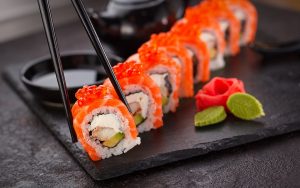You find out you’re pregnant, and then a flood of questions begins: will it be a natural birth or a C-section? What will the baby’s name be? And beyond that, questions start about what to eat, the ideal amount, and so on.
Many moms are unsure about what types of foods should not be consumed during pregnancy since this is a special time when extra care is necessary.
Because nutrients are passed from mother to child, greater attention should be paid to the consumption of certain foods. And what woman hasn’t heard about the dangers of eating Japanese food? And what about a glass of wine, is it harmful to have it every now and then? Are cheese and eggs a problem too? We will address these and other questions throughout this article!
Japanese Food
Because it is served raw and features a variety of fish and seafood, many women feel wary about eating this type of food.
Indeed, there are worries about consuming these foods because, if not prepared properly, they can cause infections and food poisoning if they contain bacteria.
Cheese
Cheese is an important source of nutrients during pregnancy, but certain types are not recommended for consumption during this time, such as fresh and unpasteurized cheeses. Like Japanese food, they can contain bacteria that cause infections, which in turn can result in miscarriage. So, be very careful with cheeses like gorgonzola, brie, or camembert!
Eggs
Eggs are one of those foods found in almost every diet, right? In fact, eggs are highly nutritious and help improve our resistance to infections. However, eating raw eggs is not recommended for pregnant women due to the risk of salmonella contamination. Therefore, homemade mayonnaise made with raw eggs, unfortunately, should not be consumed during pregnancy. Opt for eggs cooked in other ways to ensure there is no bacteria present.
Coffee
All coffee contains caffeine, which is a stimulant and can cause reactions in the baby. Because of this, coffee and all foods containing caffeine (teas, sodas, energy drinks) should be consumed in moderation and never in excess.
Chocolate
Who doesn’t love chocolate! This sweet is truly a passion for many people, and not eating it can be quite difficult.
Fortunately, chocolate is allowed during pregnancy. Of course, it should be consumed in moderation, as with all foods. As mentioned earlier about coffee, chocolate contains caffeine, so consumption should be moderate to avoid any effects on the baby. When combined with a balanced, healthy diet, a bit of chocolate now and then is fine.
The ideal choice is dark chocolate, as it has less sugar and more cocoa content. The higher the cocoa content, the less fat, sugar, and milk are present.
A word of caution for pregnant women who are overweight or have gestational diabetes. In these cases, it’s best to have a doctor determine the ideal amount to eat, or if it’s better to avoid chocolate completely.
Cinnamon
This is one spice that causes doubt among pregnant women. That’s because it stimulates circulation and gets your heart racing.
There are questions about whether cinnamon can induce miscarriage. Although many doctors agree that it’s only risky in large amounts, it is generally not recommended during pregnancy because this is a delicate and sensitive time. Better safe than sorry!
Chili Pepper
Chili pepper is a commonly used seasoning in Brazilian cooking. Some people claim that it can induce labor, but there is no scientific evidence to support this.
What may happen is that some women are more sensitive to chili, which can cause heartburn and indigestion. So, it’s best to eat it in moderation to avoid any discomfort.
Wine and Other Alcoholic Beverages
Although there aren’t many studies on the effects of consuming small amounts of alcohol during pregnancy, the recommendation is that all pregnant women should avoid alcoholic beverages entirely. Drinking alcohol during pregnancy can cause serious risks to the baby, such as Fetal Alcohol Syndrome. There is also an increased risk of miscarriage and malformation.
The best option is to choose non-alcoholic drinks so there’s no risk to your developing baby.












